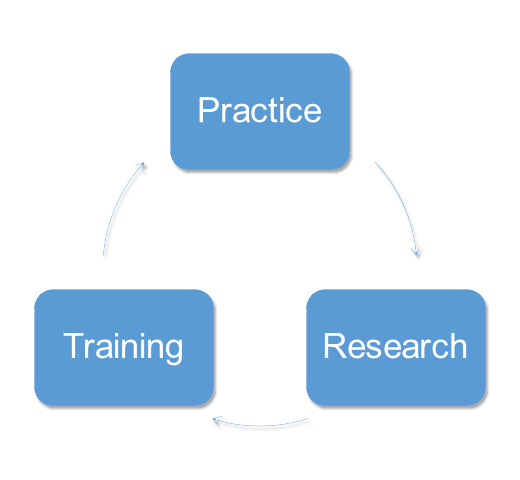Importance of the “Practice-Research-Training” nexus in Peacebuilding
In a good university hospital, one cannot imagine the absence of one of the three pillars for the good functioning of a health institution: practice, training and research in the field of medicine and health sciences. Many other fields of human activity follow the same scheme to improve knowledge accumulation, knowledge management and sharing, and knowledge in practice. Peacebuilding, the equivalent of medicine in “social health”, benefits highly from this scheme to improve its approaches and tools and to be more effective and impactful. In fact, the development of peace studies in the last seven decades was grounded on the “practice- training-research” triad.
by Abbas Aroua
by Abbas Aroua
In a good university hospital, one cannot imagine the absence of one of the three pillars for the good functioning of a health institution: practice, training and research in the field of medicine and health sciences. Many other fields of human activity follow the same scheme to improve knowledge accumulation, knowledge management and sharing, and knowledge in practice. Peacebuilding, the equivalent of medicine in “social health”, benefits highly from this scheme to improve its approaches and tools and to be more effective and impactful. In fact, the development of peace studies in the last seven decades was grounded on the “practice- training-research” triad.
Practice opens new avenues for research and provides researchers with new ideas and themes to explore as well as precious raw material from the field to exploit. It prevents them from going around in circles, investigating what has already been explored.
Research has various functions in this process: when it is practice-oriented and actionable, it informs practice: it helps in analysing the conflict, understanding the context, elaborating the best strategy of intervention and designing the most effective peace process. When it is theory-oriented, it helps in theorising and formalising the lessons learned from practice to improve the knowledge base of peacebuilding. When it is policy-oriented, it helps in developing the most effective peace promotion messaging to policy makers and other influencers.
 The outcome of sound research allows improvement in the curricula used for training and capacity building. It helps in updating methods to be able to cope with new situations and emerging issues.
The outcome of sound research allows improvement in the curricula used for training and capacity building. It helps in updating methods to be able to cope with new situations and emerging issues.
The improved curricula equip trainees with effective theoretical tools to perform, in their duties as peace actors, evidence-based practice in the field.
And so the loop goes on and on.
Since its inception in 2002, CPI has put the “practice-training-research” triad in the heart of its action. CPI has learned that for this loop to function effectively and produce innovative results in peacebuilding, the research has to be matched with the mission and needs of the peace organization, the training has to be tailored to the profile of the trainees and the practice has to be context-sensitive.
The absence of one the three components of this magic combination, “practice-training-research”, deprives the peace organisation of an important dimension of peace promotion and prevents it from benefiting from a powerful synergy capable of boosting the impact of the action of the peace organisation in the field.










